Eric Bana Funny People & The Time Traveller's Wife Interview
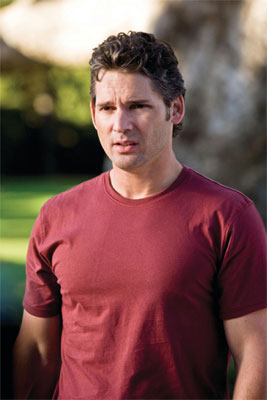
THE SUMMER OF BANA
EXCLUSIVE Eric Bana, Funny People, The Time Traveller's Wife Interview by Paul Fischer.One can say this has been quite the Bana year for Australian actor Eric Bana. First seen this year in the acclaimed JJ Abrams' Star Trek, Bana will next grace our screens playinfg an Aussie in Judd Apatow's Funny People, and later this year stars opposite Rachel McAdams in the long awaited Time Traveller's Wife. Yet despite his success, he still calls Australia home, as he explained to Paul Fischer.
QUESTION: So, one could say this is a 'banner' year for you. How surprised are you by the fact that you're in three summer movies this year.
ERIC BANA: I know. it just turned out that way, you know? I don't think you ever think that all the movies are going to come out within a relatively short period of time, but you think they're going to be scattered. So - you know, Star Trek was originally going to be released Christmas. Time-Traveler's Wife never really had a release date before this release date, but I guess we all assumed it was going to come out earlier. So, I never imagined that the three films would come out within - you know, six months of each other. But, It's nice, in a way, because I've never had it before. Usually people see me once every 18 months, or whatever it is. So, now they're paying for that. [LAUGHTER]
QUESTION: Were you surprised when Funny People came to you in the first place? I mean, being the outside of this group, and not known by Americans as a comedic actor, how surprised were you?
ERIC BANA: I was pleasantly surprised. I mean, I was and I wasn't. I was pleasantly surprised because I felt very blessed to be given the opportunity. But I wasn't at all surprised that someone like Judd was aware enough that he knew what my background was. I figured that made a lot of sense, you know, because I was such a fan of his work, and figured that he'd be someone who'd be incredibly well-versed on everything to do with comedy and people's backgrounds, and so forth. So, it didn't surprise me that he'd done his homework on me. And when we spoke, he kind of scared me with how much stuff he'd seen. I was like - I don't even remember that sketch. So, no, it was an honor, you know? 40-Year-Old Virgin was probably my favorite film that year, and I remember saying that publicly lots of times. And I think a lot of his films, both 40-Year-Old Virgin and Knocked Up, when you see them, especially Knocked Up, when you see them a second and third time, they're actually more serious than you think they are. Like, I actually think Knocked Up has quite a lot of great -
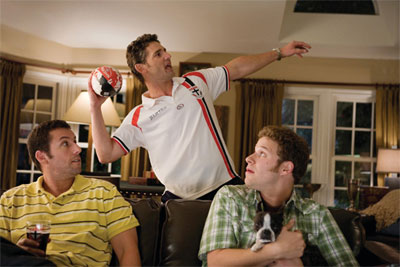 QUESTION: Dramatic depth to it.
QUESTION: Dramatic depth to it.ERIC BANA: Yeah, yeah. Far more so than the first time you see it. So, no, I think he's awesome.
QUESTION: Now, you suggested that you could make this character more fun if he was Australian. How much fun was it for you to play an Australian character in this context?
ERIC BANA: Well, I just felt like the character was pretty crazy to begin with and I thought I could make him crazier. Now my character is not one of the funny people. You know, the irony is, he's the only non-funny person in the film. He's the non-stand-up comedian. He's not a funny person. He's just a whack job and I just felt that he would seem more out there, if he was Australian. I thought some of the references would be more far-fetched, and would make him seem crazier. If that then made him funnier, great. But - you know, my guarantee to Judd wasn't that he'd be funnier, it was just that I think he'd be even more crazy, and more interesting, if I can let him be Australian. And I've got a bunch of ideas, if we can go in that direction.
QUESTION: How much of those Australian-isms were worked out very thoroughly by you before like that whole Australian Rules sequence, which is very funny.
ERIC BANA: No, no, no, I spoke to Judd about it in length, and then he just let me go. And I was the kind of unofficial AFL advisor on the film, and - they said, "Well, is there a club in particular he'd follow?" And I said, "Well, absolutely." And I made it my club, because again, it just made all the references easier, and I knew everything about my club.
QUESTION: Shameless self-promotion.
ERIC BANA: But it was for the good of the film. There was no point in my trying to pretend I was a Collingwood supporter. I don't know anything about Collingwood. I hate 'em. So. [LAUGHTER] I just made him a Saints supporter. It was a lot more efficient.
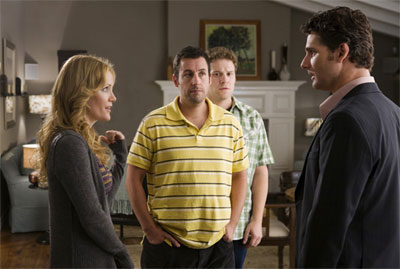 QUESTION: Was there much cut?
QUESTION: Was there much cut? ERIC BANA: Oh, yeah, yeah. One night in the bungalow, I think I ranted and raved for an hour non-stop. We just changed mags every ten minutes. I did a drunken rage description of Australian rules football. We played a game of Australian rules football in the bungalow, where I was kicking the ball and tackling Seth and Adam, and just about knocking them out, and breaking televisions, and going nuts. So, that condensed to about ten seconds, but there is a hell of a lot of extra footage there of me just going absolutely insane, as a drunk raving Saints supporter. Which wasn't too much of a stretch.
QUESTION: Did doing this movie and reading this script remind you of why you were a stand-up comic in the first place? And did it remind you of the early days?
ERIC BANA: It definitely reminded me of the early days. I mean, I was - yeah. I felt very nostalgic that all the stuff - of the comedians hanging out together, and trying material on each other, was totally the world that I'd come from and knew really well. So, I was really pleased to see that Judd was showing that side of the comedy world. Because that's very realistic, you know, if you're a stand-up comedian. That's - you kind of hang out together, and are trying material on each other, and helping each other out and stuff. So, it did remind me a lot of the early days. And also reminded me of the stuff that I didn't enjoy about stand-up comedy, like Adam had just touched on before. We had, like, a little press conference. And he was saying, "When it's great, it's truly great. And when it's not, it's truly not." You know, it really isn't. And working on films is just far more team-oriented, and more kind of - I guess, evenly-keeled, you know?
QUESTION: Do you miss it?
ERIC BANA: I don't- I do not miss being on tour and doing stand-up. I miss the storytelling. I really enjoyed that. My guess is, it's probably - you know, one of the reasons I went back and did the doco. And I really enjoyed it. So I got to, like, blow all my juices on that, you know, for a few years. But I don't really miss going up on stage to a room full of a few hundred strangers night after night. I truly don't miss that. I do miss - you know, the freedom that comes with it. Like, it's the purest form of entertainment. There's no editing, there's no one giving you a second opinion. If you think something's funny, you walk up on that stage and you say it. And if it gets a laugh, it works. And if it doesn't, it's on you. You know. And - there's no one to tell you you can't do it. There's no one to try and modify your ideas, or - so, it's a very pure form of performance and entertainment. And acting is not that. Acting has a lot that gets in the way of it, sometimes. So, you miss that side of it. But realistically, I don't. I don't miss it that much.
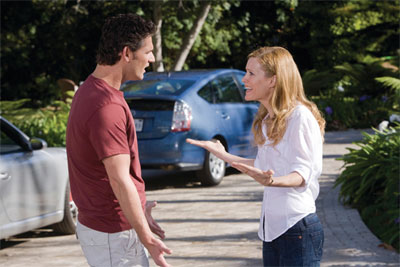 QUESTION: Was directing your documentary Love the Beast a release for you? Would you want to do it again? Did it instill a creative part of you that you really didn't think you had, or that you felt you really wanted to explore?
QUESTION: Was directing your documentary Love the Beast a release for you? Would you want to do it again? Did it instill a creative part of you that you really didn't think you had, or that you felt you really wanted to explore?ERIC BANA: No, it was probably more a case of rekindling the creative side that had been forced to be dormant for a long time. I used to write and produce my own TV show, and write my own stand-up, and perform it. And then you become a dramatic actor, and you're limited in how much of your own interpretation you can have on it. I mean, you're limited by the framework of the film, and the characters. So, you don't have the same - you pour the same amount of energy into it, but you don't have the same creative license that you do when you work on your own project. So, it was a great, great joy to be let loose in that regard, and go back to - you know, storytelling. So, I loved that, and I had a great time making it. And it was a very difficult film to make, but it was a really rewarding thing to do.
QUESTION: Did it give you a sense that you want to direct a feature?
ERIC BANA: Yeah, I'd be lying if I said I don't want to do it again. I'd probably next time do a narrative, so - I'd like to direct a tiny film one day. But it took me 38 years to come up with the first idea, so I won't hold my breath.
QUESTION: You seem to do a lot of really great work in Australia, too. Is there a comfort zone, being in Australian film? Do you think that you would like to do a lot more work over there?
ERIC BANA: Not really. I don't set out to do or not do stuff at home. It just either happens or it doesn't. But I don't sort of have a formula where I think, "I'll do three overseas films, and then come back and do one." I don't feel like I owe anything. I don't feel like it's some duty that I need to - like, I don't feel any obligation. In fact, I think the opposite. I think that the less someone like me does, the better. If it's someone else that's getting the gig, great. You know? So, I don't feel any sense of great responsibility to be doing a certain number of Australian films. I have a production company there, and - you know, if something comes up that I think's relevant and good, then I'll do it. But no, I don't feel like there's a certain quota that I need to meet.
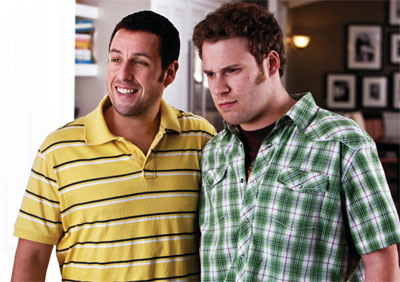 QUESTION: Now, Time-Traveler's Wife is finally coming out. It strikes me as being - I have not read the book - but from what I've seen, as being a very old-fashioned, romantic, classic kind of film. Is that how you saw it when you signed on to do it?
QUESTION: Now, Time-Traveler's Wife is finally coming out. It strikes me as being - I have not read the book - but from what I've seen, as being a very old-fashioned, romantic, classic kind of film. Is that how you saw it when you signed on to do it?ERIC BANA: I'd read the book and to me, it was just one of the purest love stories, to me, just this notion - these characters that are just desperate to be together, but can't always be together. So I guess it's the ultimate love story, in the sense that it's a couple who are a couple, but also have that unrequited love element that sends people crazy. You know. So, it's almost like the best of those two worlds coming together. And it's a very unique framework. It's a very unique story. Getting to do it with Rachel was a dream. She's awesome, and she's a great actress, and - you know, she's an absolute legend of a girl. So, getting to work with her on a film like that, it was fantastic. And yeah, I'm excited that it's coming out.
QUESTION: Is there a huge difference between the book and the movie?
ERIC BANA: There are a few differences. I mean, it's a very hard book to adapt, there's no doubt. Yeah.
QUESTION: What are you going to be doing next?
ERIC BANA: I have no idea. I've not fallen in love. I've been reading and reading, and - this year's been slated to nothing but press. I mean, I've - back home, had four films. Obviously these three. So, I couldn't schedule anything to shoot this year, so I'm just reading and reading for next year. And haven't found anything yet.
QUESTION: Do you prefer to be living in Australia?
ERIC BANA: I've never lived anywhere but Melbourne, yeah.
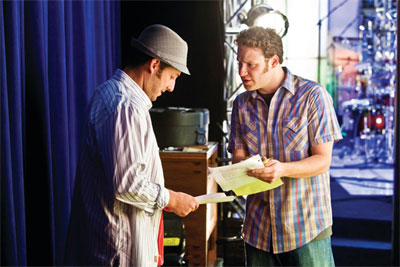 QUESTION: How often do you get to stay at home? As much as you can?
QUESTION: How often do you get to stay at home? As much as you can?ERIC BANA: Eighty percent of the time, I guess.
QUESTION: How important is that to you, to do that? I mean, why did you resist - I'm sure you've had agents and people telling you, "Oh, you've got to go"-
ERIC BANA: Do you know what? No. Believe it or not, it's just a really practical idea. I mean, it's practical, and it's impract-it's impractical, because it means I have to travel a lot. But if I lived in London, or I lived in LA, I would spend 70 percent of the time traveling back to Australia when I'm not working. So, really, it makes the most sense of me to just keep living where you live, and travel for work. It's as simple as that, you know?
QUESTION: And you have a family. I mean, you have kids and all that.
ERIC BANA: Yeah. Yeah. I mean, you've got to live somewhere. You may as well live at home, right? So - I mean, for us, it works. And I've never really contemplated doing it any other way. I split my time between Melbourne and Sydney, and it just works for us.
QUESTION: Are you as passionate about acting now as you were when you started?
ERIC BANA: No, I'd say probably more so. As I've gotten older, I think I've sort of gotten more and more in love with it with every film. I love the process. Love all the departments, love working with people. You know. Bit of a camera buff, so I love the camera and everything that it can do. And yeah, I love it.
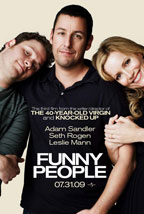
Funny People
Starring: Jonah Hill, Adam Sandler, Seth Rogen, Leslie Mann, Eric Bana, Jason Schwartzman, RZA, Ken JeongDirector: Judd Apatow
Genre: Comedies
Runtime: 2 hrs 20 mins
Over the past few years, writer/director Judd Apatow (The 40-Year-Old Virgin, Knocked Up) has shown that nothing?not even losing your virginity or the miracle of childbirth?is sacred. About his third film behind the camera, he says, "I'm trying to make a very serious movie that is twice as funny as my other movies. Wish me luck!" Apatow directs Adam Sandler, Seth Rogen and Leslie Mann in Funny People, the story of a famous comedian who has a near-death experience.
Adam Sandler, Eric Bana, Jason Schwartzman, RZA and newcomer Aubrey Plaza join a cast that reunites Judd Apatow with Seth Rogen, Leslie Mann and Jonah Hill in their third comedy together.

The Time Traveller's Wife
Starring: Eric Bana, Rachel McAdams, Ron Livingston, Arliss Howard, Stephen Tobolowski, Alexis Ferris, Michel Proulx, Michelle NoldenDirector: Robert Schwentke
Genre: Dramas
Runtime: 1 hr 47 mins
Based on the best-selling book about a love that transcends time. Clare has been in love with Henry her entire life. She believes they are destined to be together, even though she never knows when they will be separated: Henry is a time traveler -- cursed with a rare genetic anomaly that causes him to live his life on a shifting timeline, skipping back and forth through his lifespan with no control. Despite the fact that Henrys travels force them apart with no warning, Clare desperately tries to build a life with her one true love.
MORE
- Viggo Mortensen The Road
- 24 Cast Reunion
- Aaron Eckhardt No Reservations
- Aaron Eckhart The Dark Knight
- Adam McKay Step Brothers Interview
- Alan Alda Diminished Capacity Interview
- Alan Alda Diminished Capacity Interview
- Alex Dimitriades
- Al Pacino Oceans 13
- Alan Rickman Snow Cake
- Alan Rickman Sweeney Todd



